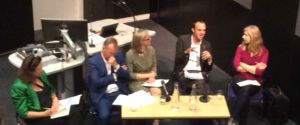This post was contributed by Anna Marry, Communications Manager, LIDC. It originally appeared on the LIDC blog.
Inter-collegiate, interdisciplinary events are always a pleasure to go to, and not only because of LIDC’s focus on interdisciplinary research in international development working with five Bloomsbury Colleges. That particular approach often unearths issues that would not have been unearthed otherwise, and bringing together academics with the NGO community and policy-makers makes such events even more stimulating.
The Bloomsbury Humanitarian Debate in June was no different. Organised for the fifth time by two LIDC member colleges: Birkbeck and London School of Hygiene & Tropical Medicine (LSHTM) and their partner Medecins sans Frontieres (MSF), this series of events explores various issues in the humanitarian sector using a debate format with academic and non-academic experts.
The June event was on resilience in the humanitarian sector. The panel included speakers from MSF, Humanitarian Outcomes, University of Bristol and University of Cambridge. The audience was mostly composed of humanitarian experts themselves, including policy-makers and donors.
Sandrine Tiller from MSF argued that focusing on resilience undermines necessary short-term responses to humanitarian crises. She pointed out that merely surviving is not the same as coping – we often think that people in crisis, for example in Somalia, are resilient, while in fact they are just staying alive.
Paul Harvey from Humanitarian Outcomes disagreed with that view, claiming that resilience was in fact just a new repackaging of an old concept. Resilience is not necessarily anti-relief and can be very helpful. Instead of criticising resilience as a concept and hair-splitting over semantics, one should focus on specific things that work or do not work in short- and long-term responses to humanitarian crises.
 Professor Mark Duffield from Bristol University reiterated the view that resilience was not a new concept. According to the expert, the aid industry reinvents itself every few years and now the Holy Grail seems to be resilience. The speaker pointed out a dangerous trend in disaster relief, which he called ‘digital humanitarianism’ – private sector companies boiling down disaster responses to technical fixes. After all, buying an app that tells you how to avoid flooding or pollution, is not going to solve the fundamental issue of the risk of floods or polluted air and water.
Professor Mark Duffield from Bristol University reiterated the view that resilience was not a new concept. According to the expert, the aid industry reinvents itself every few years and now the Holy Grail seems to be resilience. The speaker pointed out a dangerous trend in disaster relief, which he called ‘digital humanitarianism’ – private sector companies boiling down disaster responses to technical fixes. After all, buying an app that tells you how to avoid flooding or pollution, is not going to solve the fundamental issue of the risk of floods or polluted air and water.
The fourth speaker, Professor Virginia Murray from Cambridge University, defended the concept of resilience, drawing on her experience working with inter-governmental disaster risk reduction processes. She argued that resilience is crucial for those high-level international forums, as it resonates well and is easy to translate.
The discussion that followed raised interesting issues such as:
Is local civil society key to resilience?
While resilience seems to be a fairly clear concept when applied to natural disasters, what role does it have in conflict?
Does focus on resilience detract donor funding from humanitarian responses?
Saving lives today versus saving lives tomorrow – does one occur at the expense of the other?
Is it the role of NGOs to engage in state-building, or should they focus on short-term relief efforts?
It was fascinating to listen to the arguments both for and against. The debate made me wonder, however, if the contention is not in fact over definitions rather than the actual concept. After all, few would argue against humanitarian aid in crisis, where saving lives is an absolute priority, and few would completely rule out development efforts that have a chance of preventing crises in the long run. As with many things in life, it may be a question of balancing one with the other. Whether we use the term ‘resilience’ or not, is another matter. It may be safer to think of another term that stirs less controversy.
Either way, I will be watching this space and looking forward to the next Bloomsbury Humanitarian Debate. Earlier this spring LIDC launched its new Working Group on Humanitarian Crisis that brings together academics interested in conflict and natural disaster from across Bloomsbury Colleges. A few weeks ago LIDC awarded one of its annual Fellowship grants to Dr. Tejendra Pherali from the Institute of Education and Dr. Karl Blanchet from London School of Hygiene and Tropical Medicine to explore the educational and health response to the Syrian refugee crisis in Jordan and Turkey.
Humanitarianism is certainly a very potent area for interdisciplinary, inter-institutional research to explore.
